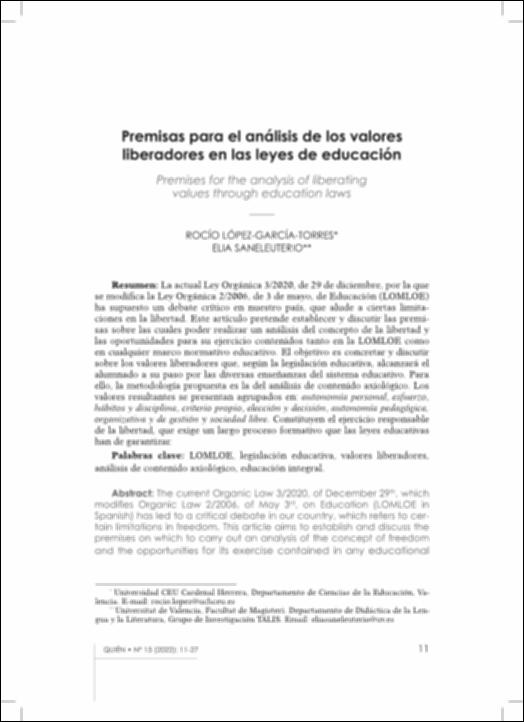Please use this identifier to cite or link to this item:
http://hdl.handle.net/10637/14476Premisas para el análisis de los valores liberadores en las leyes de educación
| Title: | Premisas para el análisis de los valores liberadores en las leyes de educación |
| Other Titles: | Premises for the analysis of liberating values through education laws |
| Authors : | López García-Torres, Rocío Saneleuterio Temporal, Elia |
| Keywords: | Spain. Ley de educación, 2020 - Content analysis.; España. Ley de educación, 2020 - Análisis de contenido.; Educación - Legislación - España.; Education - Law and legislation - Spain.; Liberty.; Valores sociales.; Libertad.; Valores (Ética); Values.; Social values. |
| Publisher: | Asociación Española de Personalismo |
| Citation: | López García-Torres, R. y Saneleuterio, E. (2022). Premisas para el análisis de los valores liberadores en las leyes de educación. Quién: revista de filosofía personalista, n. 15 (en.-jun.), pp. 11-27. |
| Abstract: | La actual Ley Orgánica 3/2020, de 29 de diciembre, por la que
se modifica la Ley Orgánica 2/2006, de 3 de mayo, de Educación (LOMLOE)
ha supuesto un debate crítico en nuestro país, que alude a ciertas limitaciones
en la libertad. Este artículo pretende establecer y discutir las premisas
sobre las cuales poder realizar un análisis del concepto de la libertad y
las oportunidades para su ejercicio contenidos tanto en la LOMLOE como
en cualquier marco normativo educativo. El objetivo es concretar y discutir
sobre los valores liberadores que, según la legislación educativa, alcanzará el
alumnado a su paso por las diversas enseñanzas del sistema educativo. Para
ello, la metodología propuesta es la del análisis de contenido axiológico. Los
valores resultantes se presentan agrupados en: autonomía personal, esfuerzo,
hábitos y disciplina, criterio propio, elección y decisión, autonomía pedagógica,
organizativa y de gestión y sociedad libre. Constituyen el ejercicio responsable
de la libertad, que exige un largo proceso formativo que las leyes educativas
han de garantizar. The current Organic Law 3/2020, of December 29th, which modifies Organic Law 2/2006, of May 3rd, on Education (LOMLOE in Spanish) has led to a critical debate in our country, which refers to certain limitations in freedom. This article aims to establish and discuss the premises on which to carry out an analysis of the concept of freedom and the opportunities for its exercise contained in any educational regulatory framework, included the LOMLOE and. The objective is to specify and discuss the liberating values that, according to educational legislation, students will achieve as they pass through the various teachings of the educational system. For this, the proposed methodology is the axiological content analysis. The resulting values are grouped into personal autonomy, effort, habits and discipline, own criteria, choice and decision and pedagogical, organizational and managerial autonomy and free society. They constitute the responsible exercise of freedom, which requires a long training process that educational laws must guarantee. |
| Description: | Este artículo se encuentra disponible a través de la siguiente URL: https://www.personalismo.org/wp-content/uploads/2022/11/Revista-Quien-15-ESTUDIOS-1.pdf |
| URI: | http://hdl.handle.net/10637/14476 |
| Rights : | http://creativecommons.org/licenses/by-nc-nd/4.0/deed.es |
| ISSN: | 2443-972X 2952-4946 (Electrónico) |
| Language: | es |
| Issue Date: | 28-Jan-2022 |
| Center : | Universidad Cardenal Herrera-CEU |
| Appears in Collections: | Dpto. Ciencias de la Educación |
Items in DSpace are protected by copyright, with all rights reserved, unless otherwise indicated.


